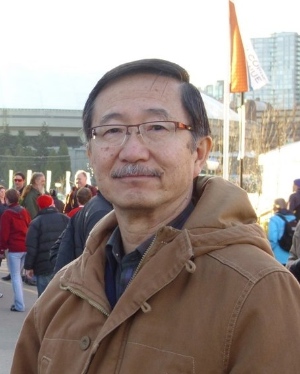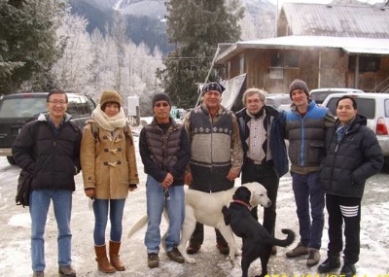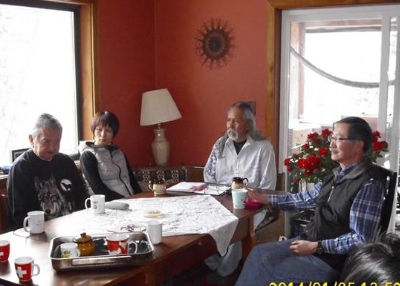Bill Chu has been active for many years on a number of social justice issues – including opposition to gambling, support for aboriginal rights and stressing the importance of recognizing historic injustices to the Chinese community.
Following are two current expressions of his activities. First, a (slightly modified) version of his letter to supporters following a recent visit to Mount Currie Reserve (just past Pemberton). He has introduced about 1,800 people to that community in the course of many visits over the past 20 years.
Second is a brief excerpt from his recent Huffington Post comment about the provincial government’s planned Chinese Head Tax apology.
Dear friends:
We have much to give thanks for, following a successful relief trip to Mount Currie last Sunday. First of all, thanks to 18 of you, we raised a total of $2,265, all of which was used to purchase 96 grocery vouchers. In addition, a number of you donated many bags of groceries and boxes of fruit to almost fill the trunks of a car and a big SUV. May the Creator bless you for thinking about the marginalized. I am also thankful for the six of you joining the trip.
We first stopped at a home in Mount Currie, where we heard from an elder and others about life under the Indian Act and the bad salmon run last summer.
After missing some people at their humble homes, we walked down to Lillooet Lake and witnessed the environmental destruction caused by outside clear-cutting over the years.
A postcard-like lake two decades ago is now littered with deadheads, and the sediment deposit is creating a fast-growing delta at the river mouth. What used to be a sandy beach is now covered with a sticky layer of silty clay. Their traditional fishing village is now almost abandoned, since boat fishing from a lake strewn with stumps and debris must be very difficult.
We also are thankful for the sunny and dry weather, nothing like the stormy snowy weather up that way now. In fact, the road was so clear that we ventured all the way to Melvin Creek, just 50 kilometres from Lillooet.
There we brought much-needed food and vouchers to a native man who has stationed himself in a shack on a most remote hillside for the last 12 years. As he is there to demonstrate his people’s ownership of the land against a proposed ski resort, he has been subjected to abuses, including removal by the government of a timber bridge over a stream, having his shack set on fire while he was sleeping inside, and being randomly shot at.
While inside his dark shack, we learned more about his solitary life and the risks posted by strangers – one pointed a gun at his head just a few days ago.
I should add that the day before, I sent a press invitation out, not really counting on any media showing up on a Sunday morning at 8 am, but just letting them know about our unique trip. My faith turned out to have been too small, as three reporters with two TV cameras were waiting at our meeting place!
So aside from describing our mission, I was able to mention outside factors leading to the demise of our wild salmon (such as virus spread by salmon farms, discharge of polluted effluents into the Fraser, and global warming with deadly water temperature rise). Our trip was reported on Global TV as well as Mingpao.
In any case, reconciliation is not a one time event like the Truth and Reconciliation Commission at the PNE last fall, or Christy Clark’s ‘quick win’ apology to the Chinese community, or even a one-day relief effort.
It is more about people attempting to understand and reach out to another people, in a continuous effort to restore a relationship that we were created for. While we may not see it accomplished within our lifetime, we should rejoice because we have participated and seen glimpses of it.
All the best, Bill Chu, Chair, Canadians For Reconciliation Society
************************
 Bill also just posted ‘BC Chinese Head Tax apology not genuine with divide and conquer politics’ on the Huffington Post blog. Following is an excerpt; the full article is here.
Bill also just posted ‘BC Chinese Head Tax apology not genuine with divide and conquer politics’ on the Huffington Post blog. Following is an excerpt; the full article is here.
Despite the exemplary example of reconciliation by the late Nelson Mandela, politicians like to offer apologies – since those usually cost nothing, supposedly will wash over any wrongs and, if worded appropriately, can even make the ones offering them appear righteous.
So it was no surprise that offering apologies for minorities’ history was high in BC Liberal’s ‘quick-win’ multicultural strategic outreach plan leaked out from the premier’s office in March 2013 , , ,
Since she refused to commit to a process of reconciliation . . . before becoming the party leader, [Christy] Clark’s consultations on her intended apology were not preceded by first acknowledging B.C.’s full history of discriminatory legislation targeting Chinese people, educating the public about it and consulting the bigger public (including non-Chinese) on appropriate redemptive actions . . .
By treating Chinese people as the only stakeholder in B.C.’s reconciliation, the premier not only reveals her ignorance on the subject but is pushing B.C. towards the abyss of false reconciliation, and our democratic system towards even less responsibility for its mistakes, both past and present.
Yet it is not too late for British Columbians to realize the danger of such divide and conquer tactics. It is not too late for Clark to realize she has won the election and can benefit far more by being honest with history than by continuing with her office’s ‘quick win’ ethnic outreach strategy . . .


